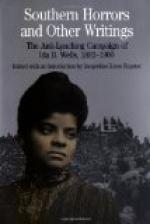Thirty-one men were arrested and thrown in jail as “conspirators,” although they all declared more than once they did not know they were firing on officers. Excitement was at fever beat until the morning papers, two days after, announced that the wounded deputy sheriffs were out of danger. This hindered rather than helped the plans of the whites. There was no law on the statute books which would execute an Afro-American for wounding a white man, but the “unwritten law” did. Three of these men, the president, the manager and clerk of the grocery—“the leaders of the conspiracy”—were secretly taken from jail and lynched in a shockingly brutal manner. “The Negroes are getting too independent,” they say, “we must teach them a lesson.”
What lesson? The lesson of subordination. “Kill the leaders and it will cow the Negro who dares to shoot a white man, even in self-defense.”
Although the race was wild over the outrage, the mockery of law and justice which disarmed men and locked them up in jails where they could be easily and safely reached by the mob—– the Afro-American ministers, newspapers and leaders counselled obedience to the law which did not protect them.
Their counsel was heeded and not a hand was uplifted to resent the outrage; following the advice of the Free Speech, people left the city in great numbers.
The dailies and associated press reports heralded these men to the country as “toughs,” and “Negro desperadoes who kept a low dive.” This same press service printed that the Negro who was lynched at Indianola, Miss., in May, had outraged the sheriff’s eight-year-old daughter. The girl was more than eighteen years old, and was found by her father in this man’s room, who was a servant on the place.
Not content with misrepresenting the race, the mob-spirit was not to be satisfied until the paper which was doing all it could to counteract this impression was silenced. The colored people were resenting their bad treatment in a way to make itself felt, yet gave the mob no excuse for further murder, until the appearance of the editorial which is construed as a reflection on the “honor” of the Southern white women. It is not half so libelous as that of the Commercial which appeared four days before, and which has been given in these pages. They would have lynched the manager of the Free Speech for exercising the right of free speech if they had found him as quickly as they would have hung a rapist, and glad of the excuse to do so. The owners were ordered not to return, the Free Speech was suspended with as little compunction as the business of the “People’s Grocery” broken up and the proprietors murdered.
5 The SOUTH’S POSITION
Henry W. Grady in his well-remembered speeches in New England and New York pictured the Afro-American as incapable of self-government. Through him and other leading men the cry of the South to the country has been “Hands off! Leave us to solve our problem.” To the Afro-American the South says, “the white man must and will rule.” There is little difference between the Antebellum South and the New South.




